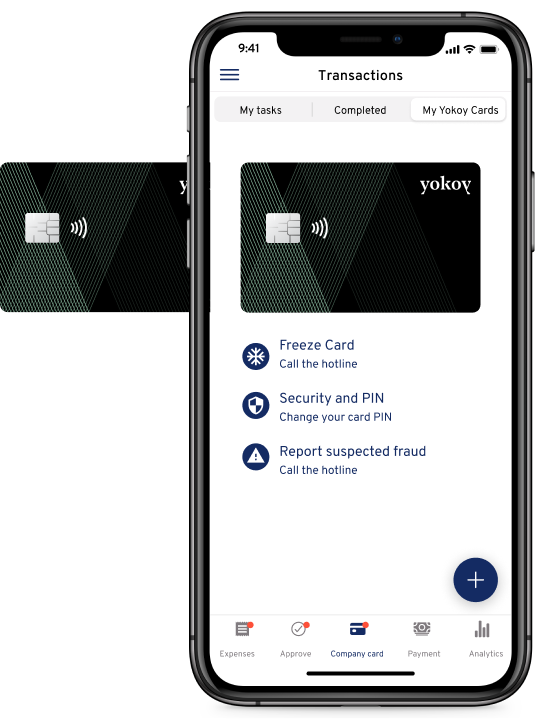Home / Corporate Card Trends to Watch in 2025
Corporate Card Trends to Watch in 2025
- Last updated:
- Blog

Once a plastic rectangle with a magnet strip and a spending limit, the corporate card has undergone a serious upgrade. In 2025, it’s not just about paying the bill—it’s about empowering teams to make smarter, safer, and more sustainable business decisions.
Driven by rapid advancements in AI and automation, today’s corporate cards come with built-in intelligence. Those brains in corporate cards work in real-time and control spending before your finance team finishes their morning coffee. This automated reconciliation frees up hours of manual work. Virtual and single-use cards are also on the rise, offering more flexible and secure payment options—especially for remote teams and project-based spending.
Security has levelled up, too, with biometric authentication ensuring that only the right person can use the card. Meanwhile, finance leaders are thinking beyond the bottom line. Card solutions must be equipped to handle the environmental, social, and governance (ESG) rules to help organisations align with sustainability goals, while enhanced cross-border functionality smooths out the bumps of global payments — no currency chaos is required.
The landscape of corporate card payments is evolving fast, and this year offers CFOs, finance teams, and accounts payable leaders a wealth of opportunities to do more with less friction, greater control, and smarter data.
Let’s explore the key trends shaping the future of payment trends and how you can stay ahead of the curve.
The evolution of corporate cards by 2025
Over the past decade, corporations have undergone shifts in terms of payment solutions. Where once physical credit cards like Mastercard or Visa were the only options employees could use for business-wide spending, today’s finance teams handle an ecosystem of smarter, more agile payment solutions. Today, businesses expect more than just an easy way to pay — they demand a system that offers real-time control, compliance, and clarity.
With automated expense reporting, real-time payments, and data-driven insights, corporate cards have transformed from passive tools into proactive financial assets. Additionally, artificial intelligence (AI) now supports fraud detection, auto-categorisation of expenses, and even spending controls that flag policy violations before they hit the ledger. But this can mean that finance teams must juggle multiple apps, vendors, and departments.
Virtual and single-use cards are also on the rise. They give businesses secure, time-limited payment options, from supplier payments to travel expenses. They simplify tracking and boost fraud prevention. With their added real-time insight, finance teams can forecast more accurately and act faster. CFOs can act proactively instead of waiting for end-of-month reports to shift gears.
Yokoy Smart Corporate Cards
Pay the smart way
Simplify your card administration and gain real-time visibility and control over your global spend with Yokoy’s Smart Corporate Cards.

Key corporate card trends shaping 2025
From AI-powered decision-making to seamless global payments, modern business card trends are redefining what it means to manage corporate spending. With modern solutions, corporations have smarter technology and tighter security for expenses.
AI-powered spend controls and automation
Gone are the days of chasing paper receipts and manually typing in spreadsheets. Corporate cards are tightly integrated with AI-driven apps that offer automated policy enforcement and intelligent spending categorisation. Machine learning detects anomalies, enforces vendor limits, and triggers real-time alerts when spending falls outside predefined rules. These systems empower CFOs and finance teams to maintain control at scale without adding complexity. With real-time payments and modern expense management, finance teams can spot overspending before it snowballs — a game changer for cash-conscious businesses managing tight cash flow.
The rise of virtual and single-use corporate cards
The demand for flexibility and control has driven a surge in virtual and single-use cards—especially for decentralised teams, freelancers, and project-based spending. These cards can be issued with a click, used for a specific transaction, and then automatically deactivated. This eliminates the risk of corporate bank accounts being leaked while boosting flexibility.
However, fraud prevention is not the only technological advancement: single-use or virtual cards simplify reconciliation and remove the guesswork from managing vendor payments. These tools allow organisations to future-proof functionality when integrated with digital wallets and mobile wallet platforms.
Stronger security with biometric authentication
Whether it’s facial recognition, fingerprint scanning, or behavioural biometrics, this technology can ensure only authorised cardholders can access corporate funds. This biometric authentication security system is taking the lead in protecting company spending. Credit or debit card issuers and providers are embedding multi-layered security protocols, including tokenisation and AI-based risk monitoring, creating a new gold standard in payment protection. This is particularly useful for remote and cross-border transactions.
Sustainability and ESG-friendly corporate cards
Since introducing the ESG, companies have turned to corporate card solutions that also support their sustainability targets. These solutions offer features like carbon footprint tracking, vendor sustainability scoring, and paperless workflows to align spending with company values. Some providers even use minimalist card designs or digital-first solutions that align with ESG goals.
Increased focus on cross-border payment efficiency
As businesses expand globally, frictionless cross-border transactions have become a strategic priority. However, managing international spending has long been a challenge, from handling multiple currencies to navigating varying tax regulations.
Today, corporate cards include functionalities to make global spending easier than ever. Finance teams can benefit from features like dynamic currency conversion, regional compliance automation, and AI-supported reconciliation. This streamlines processes, reduces fees, improves visibility, and gives CFOs greater control over international operations.
The role of AI in the future of corporate cards
As the finance function becomes increasingly strategic, artificial intelligence plays a transformative role in how companies manage expenses. AI is not just enhancing the functionality of corporate cards; it’s reshaping how finance leaders track, control, and forecast spending.
Here are only a few ways AI can help finance teams:
Always monitor spending: For businesses operating across borders, teams and currencies, AI-powered dashboards offer up-to-the-minute insights that help to ensure spend compliance — no more waiting until month-end to take action. In Addition, AI offers real-time budget tracking and expense categorisation.
Always maintain cost efficiency: Historical data is constantly analysed to stay ahead of the curve and give CFOs leeway for informed decision-making. Inefficiencies can be spotted, and AI recommends cost-saving actions—such as consolidating suppliers or flagging duplicate expenses.
Always stay ahead of the curve: AI-powered predictive analytics can forecast future spending by analysing trends, seasonal shifts, and behavioural patterns. This gives CFOs the insight to plan ahead, adjust budgets, and prevent overspending. With early warnings and smart suggestions, AI turns the corporate card into a strategic tool for long-term financial control.
Blog article
Simplifying Expense Management: How Corporate Cards Benefit Businesses of All Sizes
Although most corporate card programs offer cash back on transactions, these savings aren’t the main driver for companies who choose to equip their employees with business credit cards or debit cards.

Francesca Burkhardt,
Product Marketing
How businesses can stay ahead of these trends with Yokoy Pay
Forget those challenges for a moment. Yokoy Pay is designed to meet these hurdles head-on. AI-powered automation and seamless integration with existing finance systems can help global players and small businesses alike address the key pain points facing finance teams today.
Virtual cards for better security and flexibility
Traditional credit cards have fixed limits and broad access, which can be a liability when distributed across large or remote teams. As business models become more flexible, there’s a growing need for tailored, secure, and agile payment options. Virtual and single-use cards offer more granular control over who can spend what, where, and when.
How Yokoy Pay could help you:
Yokoy Pay enables finance teams to issue virtual cards instantly, with custom spend limits, usage rules, and merchant restrictions. These cards can be assigned to employees, departments, or even specific use cases and deactivated automatically after use. This reduces the risk of fraud, streamlines reconciliation, and supports mobile wallet and digital wallet integration for on-the-go teams.
Ensuring compliance with regulatory updates
Global finance teams face a growing web of regulations regarding card payments, data privacy, and cross-border spending. From local tax rules to industry-specific compliance, staying current is time-consuming, and falling behind is costly.
How Yokoy Pay could help you:
Yokoy Pay is designed to help businesses ensure compliance with evolving regulations by automating checks and adapting workflows to new requirements. Whether it’s EU-based data protection rules, VAT handling, or corporate financial services regulations, the platform aligns finance teams through real-time updates, audit trails, and policy-based spend controls — significantly reducing compliance risk.
AI-powered spend management for better control
Manual spend management is slow, error-prone, and ineffective at catching real-time misuse. To maintain tighter control, finance leaders need a smarter way to enforce spending policies across departments, regions, and projects.
How Yokoy Pay could help you:
At the heart of Yokoy Pay is a powerful AI-driven engine that automates expense categorisation, flags suspicious activity, and enforces real-time policy checks. This level of intelligence provides a centralised view of all expenses, helping CFOs ensure consistent compliance and reduce human error. With AI always on, you gain continuous oversight without adding an administrative burden.
Real-time reporting to streamline operations
Finance teams often operate in the dark until the month-end closes. Without real-time payments data, it’s challenging to forecast, manage budgets, or catch anomalies in time to take action.
How Yokoy Pay could help you:
Yokoy Pay delivers integrated real-time reporting, offering instant insights into card transactions as they happen. Dashboards and analytics tools give AP managers and CFOs visibility into spending by team, category, or geography. This enables faster, more informed decisions, better cash flow management, and simplified forecasting.
Fraud detection powered by AI to reduce risks
As digital spending increases, so too does the risk of fraud. Traditional monitoring methods are reactive and often miss subtle signs of misuse until it’s too late, especially when teams are distributed or scaling fast.
How Yokoy Pay could help you:
Yokoy Pay uses AI-powered fraud prevention to monitor card usage continuously and intelligently. The system flags unusual behaviour based on patterns and context, not just static rules. Whether it’s duplicate payments, unusual merchant activity, or attempted policy bypasses, potential threats are detected and escalated in real time, helping your organisation maintain trust, compliance, and security.
Next steps
Ready to leave clunky processes and blind spending in the past? With AI-powered controls, real-time visibility, and ESG-friendly features, 2025’s smartest finance teams are already reaping the benefits. Book a demo today and discover how to transform your company’s expense management — one smart swipe at a time.
In this article
See intelligent spend management in action
Book a demoRelated content
If you enjoyed this article, you might find the resources below useful.


